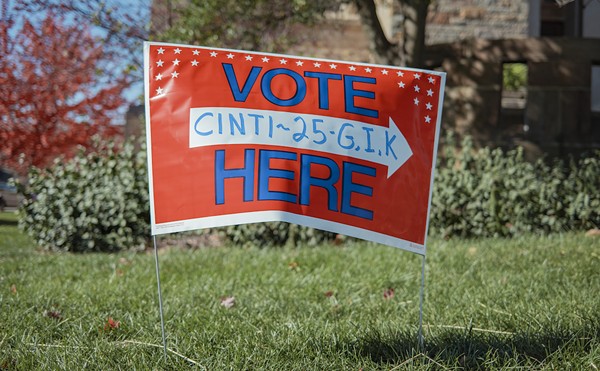Hamilton County voters will decide if $6.5 million in funding should be cut from University Hospital after county officials recently decided to put a revamped property tax levy on the fall ballot.
Commissioner Greg Hartmann, a Republican, introduced the proposal earlier this month to reduce the Health and Hospitalization levy, commonly known as the Indigent Care levy. The measure helps pay for health-care services for poor and uninsured county residents.
After much debate and public outcry, commissioners voted 2-1 earlier this month to place the reduced levy on the Nov. 8 ballot. Hartmann and Commissioner Chris Monzel, also a Republican, supported the reduced amount; Commissioner Todd Portune, a Democrat, was opposed.
Currently the five-year levy generates about $46.5 million annually for University Hospital. Property owners are taxed $48.80 annually for every $100,000 of property value. Hartmann’s proposal drops the levy to three years and to a taxation rate of $43 annually for every $100,000 of value, which is a 17 percent reduction.
“(Our taxation) responsibility required commissioners to strike a careful balance between the needs of our most disadvantaged in our community and the ability of our property taxpayers to fund these services,” Hartmann wrote in his proposal.
At the same time Hartmann proposed to reduce the Indigent Care levy, however, he also floated the idea of a new half-cent sales tax to help cover looming deficits in the county's stadium account. Such a tax could generate about $61 million annually.
Some critics said it was disingenuous of Hartmann to call for a tax benefitting the millionaire owners of professional sports teams while cutting aid for the poor.
Hartmann, though, said county government is having to cut expenses because of the rough economic times, just like residents are. During the past three years, Hamilton County’s general fund — which pays for public safety, among other items — was reduced by $62 million, or 23 percent, dropping the county's spending to 1998 levels.
Portune preferred the levy's amount remained consistent. For University Hospital to continue providing the required level of support to maintain the hospital's commitment to poor people, it needs the same amount of funding, he added.
"I was disappointed with the other commissioners for placing a greater value on residents saving less than a penny a day (in property taxes) than on keeping safety-net care," Portune says.
But Hartmann counters the reduction is a comprise with taxpayers and would focus the Indigent Care levy more on preventive measures, like health care for homeless people.
In a statement issued by hospital officials in July, they urged the commissioners not to alter the levy.
"In light of the 25 percent cut to the levy in 2006, if University Hospital must continue diverting additional resources to sustain its safety-net mission due to even further reductions in the levy, we will be forced to make significant programmatic changes to our safety-net mission,” the statement read. “We therefore encourage the commissioner to maintain the current funding level of $26 million a year and also maintain the present five-year term.”
With the help of the current levy, the hospital has provided $141 million in charity care and $375.5 million in community benefits, making it the leader in safety-net care for the indigent in Hamilton County, according to the statement.
Hartmann says the changes to the levy are necessary.
"Overall, it is a package that takes care of the indigent," he says.
Hartmann says taxpayer funding should be targeted primarily at preventing more costly services in the future. The new levy will focus on taking care of those most at risk, Hartmann adds, listing foster children, jail inmates and homeless people as examples.
Hartmann made three recommendations to improve prevention. He suggests that commissioners create a committee to review and evaluate the Indigent Care levy funds on a quarterly basis, use $300,000 to support preventive treatment by St. Vincent de Paul Charitable Pharmacy and use $600,000 to fund facility-based homeless medical services.
The levy's duration was reduced from five to three years so voters could evaluate the impact of federal health-care reform, slated for implementation in 2014, prior to considering an additional fully funded Indigent Care levy in 2015.
Ironically, a petition effort — backed by Republicans — has put a statewide issue on the November ballot that would allow Ohio to opt out of the reforms.
Portune says the levy changes only will create more problems.
"The tax break is not meaningful to taxpayers,” he says. “More problems didn't need to be create for less than $3 a year.”
Also, Portune says the levy doesn't include funding for dental services, extending hours at health clinics or efforts to decrease the county's infant mortality rate.
Although University Hospital previously encouraged commissioners to not change the levy, it now supports the reduced amount after cutting a deal with Hartmann and Monzel, Portune says.
"(The commissioners) worked with University Hospital,” Hartmann replies. “We reached a level that University Hospital was supportive of and comfortable with.”
"The funding level established to University Hospital is the product of comprise," says Tony Condia, hospital vice president, in a written statement.
"Our next step is to work with the commissioners to determine how we can most effectively manage this reduction and to identify innovative ways that will enable us to recast our overall partnership with the county," the statement added.
Portune believes it's too early to tell if the levy will pass in the November election, but doesn't think all voters will agree with it.
"Levies like this have passed by a wide margin in the past,” Portune says, referring to the 68 percent approval it received in 2006. “But taxpayers might want to send a message to the other commissioners."
He adds that Hartmann and Monzel put a greater emphasis on lowering property taxes by less than $3 a year than caring for the indigent in the community.





